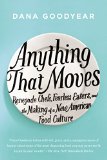Summary | Excerpt | Reviews | Beyond the Book | Readalikes | Genres & Themes | Author Bio
Renegade Chefs, Fearless Eaters, and the Making of a New American Food Culture

Critics' Opinion:
Readers' Opinion:
First Published:
Nov 2013, 272 pages
Paperback:
Nov 2014, 272 pages
 Book Reviewed by:
Book Reviewed by:
Poornima Apte
Buy This Book
At the turn of the twenty-first century there were only three horse slaughterhouses
operating in the U.S., all foreign-owned, with all the meat going to Europe and Japan.
In 2007, the last of them closed, and U.S.D.A. inspections were struck from the federal
budget, effectively banning domestic slaughter. Over the next five years, hundreds of
thousands of live horses left America to be slaughtered in Canada and Mexico, under
conditions advocates of domestic slaughter and animal-rights groups alike deplored. In
spite of laws against the practice, a report by ProPublica suggested that some of them
might have been wild horses captured by the Bureau of Land Management in round-ups and
sold to "kill buyers"; others came from racetracks and were full of steroids, anti-
inflammatories, and other medications prohibited in food animals.
In 2012, funding for U.S.D.A. inspection was restored, and various companies have
announced plans to open slaughterhouses. While the majority of the market will likely be
foreign, boosters are making a direct appeal to adventurous American foodies, on the basis
of the other exotic foods they have accepted. "The Promise of Cheval," a document recently
produced by the International Equine Business Association, asks, "In a country where
common gastronomic choices include everything from baby lambs and suckling pigs to
grasshopper tacos and alligator tails, why can you not find the horse steak that was available on the menu of the Harvard dining room in the 1990s?" (The Faculty Club
served it, with mushroom sauce and vegetables.) It goes on to describe a cheap, sweet, red meat, just out of reach. "When our Canadian neighbors are dining on delightful
meals of Cheval au Porto, where is the same lean, tender dish to tempt our palates?" When
I talked to Sue Wallis, a state legislator in Wyoming who is trying to open a slaughterhouse in Missouri, she said, "There's great action going on with artisanal
meats and butchery, and I think cheval would be interesting to those folks." Wallis
is also a raw-milk advocate. Her favorite, of course, is raw horse milk, which she has tried
courtesy of an Amish farmer who sells it to the cosmetics industry but drinks it with his
family.
The history of accidental horse-eating is long. Simmonds, in "The Curiosities of Food,"
reported that no one in the English knackers' yards could account for the hearts and
tongues, and suggested that the "ox-tongues" sold as Russian imports might be equine instead. Upton Sinclair put it on par with the other horrors depicted in "The Jungle,"
revealing that, until public outrage temporarily put a stop to it, the packers, in
addition to all their other crimes against purse and palate, were also slaughtering and
tinning horses. At the turn of the last century, the New York Times reported
frequently on a German butcher named Henry Bosse, "of horse-bologna sausage fame," who
operated a horse slaughterhouse beside the race track in Maspeth, Long Island, where he
"transform[ed] decrepit quadrupeds into odiferous bologna sausages" for shipment to
Belgium and Germany. Sometimes, the paper alleged, "after the horse meat was shipped to
Europe and manufactured into sausage it was resent to this country and sold as some of the
famous brands."
Hugue Dufour came by his "horse-bologna-sausage fame" differently—by openly appealing
to the outré tastes of foodies. Dufour, who is Canadian, grew up on a working farm;
sometimes the family slaughtered and ate their horses. Before coming to New York, he
worked for Martin Picard at Au Pied du Cochon, in Montreal. The restaurant is known for
its hedonistic foie gras and whole-animal frenzies: Animal plus Incanto. In an idiosyncratic homemade cookbook, "Au Pied de Cochon Sugar Shack," Picard chronicles a
sugaring season at a maple orchard forty-five minutes outside of town, where he has a
second restaurant. Among photographs of syrup-immersed bacchantes, and detailed
instructions on how to make squirrel sushi, he writes, "I LOVE carcasses! I like tearing
them apart and picking them clean with my fingers and I don't feel the slightest bit shy
about doing it in public."
Excerpted from Anything That Moves by Dana Goodyear. Copyright © 2013 by Dana Goodyear. Excerpted by permission of Riverhead Books. All rights reserved. No part of this excerpt may be reproduced or reprinted without permission in writing from the publisher.





The Funeral Cryer by Wenyan Lu
Debut novelist Wenyan Lu brings us this witty yet profound story about one woman's midlife reawakening in contemporary rural China.
Your guide toexceptional books
BookBrowse seeks out and recommends the best in contemporary fiction and nonfiction—books that not only engage and entertain but also deepen our understanding of ourselves and the world around us.